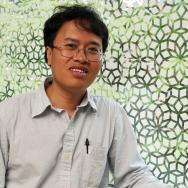Physicist Dam Thanh Son, University Professor at the University of Chicago, has been awarded the 2018 ICTP Dirac Medal for his contributions to revolutionizing human understanding of how quantum mechanics affects large groups of particles.
Son was awarded the medal with physicists Subir Sachdev of Harvard University and Xiao-Gang Wen of the Massachusetts Institute of Technology. The three winners made independent contributions toward understanding novel phases in strongly interacting many-body systems, according to the Abdus Salam International Centre for Theoretical Physics, which awards the Dirac Medal.
“I feel very honored to receive this award alongside two colleagues I deeply respect,” Son said. “The prize is especially valuable to me because ICTP is an institution created to help scientists from the developing world, and I am from Vietnam.”
Son studies how quantum mechanics affects many-body systems, which are large groups of particles that comprise everyday objects. In such systems, particles entangle and interact in complex ways, and studying these quantum entanglements helps researchers better understand the material's macroscopic properties such as density, volume and surface tension.
Many-body systems can be studied by looking at the material's phase and its transition between phases, when external conditions like temperature and pressure are slowly altered. The research of Son and his colleagues contributed to the understanding of how electron entanglement can give rise to novel phases—beyond the familiar liquid, gas and solid—as well as changes in the material's property. Such findings could help efforts to design new types of materials, leading to applications in quantum computing and superconducting devices.
"We are incredibly proud of Dam Thanh Son's achievement in the field of theoretical physics," said Angela V. Olinto, dean of the Physical Sciences Division at the University of Chicago. "This award is a testament to his intellectual leadership and the broad impact of his fundamental and cross-disciplinary research."
ICTP recognized Son specifically for his new approach, based on a technique called gauge/gravity duality, which has a root in string theory, and for studying the quantum Hall effect, involving two-dimensional matter in a very high magnetic field.
By demonstrating that gauge/gravity duality, a principle that emerged from string theory, can be useful in nuclear and condensed-matter physics, Son demonstrates the interconnected nature of physics. For example, he showed calculations in string theory and Einstein’s theory of gravity can be used to better understand the properties of quark-gluon plasma, a soup of subatomic particles that results from the collision of two heavy-nuclei.
"Son's contribution has been working across subdisciplines to use techniques and insights from one area of physics to learn things in other areas of physics," said Emil Martinec, professor of physics at the University of Chicago.
"Before Son, a lot of the work on gauge/gravity duality had been purely theoretical," said Jeffery Harvey, UChicago professor of physics. "But, by showing that you could compute properties and get certain bounds on physical quantities for real world systems, Son helped turn this theoretical problem into a tool that has implications for the real world."
Son’s current work is broadly focused on strongly interacting phases of matter and how completely new properties emerge from the strong interaction between matter’s constituents.
Son joined the UChicago faculty in 2012 and serves as University Professor in Physics, the Enrico Fermi Institute, James Franck Institute and the College. University Professors are selected for internationally recognized eminence in their fields as well as for their potential for high impact across the University.
